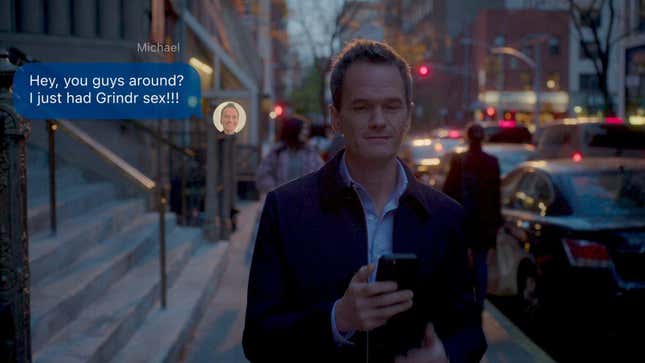‘Uncoupled’ Offers a Sideways Glimpse Into Gay Middle Age
The Neil Patrick Harris-starring Netflix series is cringe TV that's impossible to stop watching.
EntertainmentTV

Darren Star wields some kind of sorcery, and I’m really not sure if it’s good or evil. Increasingly, the television producer’s brand is can’t-miss-must-dis shows that are equally captivating and loathsome—programming that would be repellant if, in fact, people couldn’t stop watching. Star’s line of eye-roll triggers includes Emily in Paris and now, Uncoupled, which Star created alongside Modern Family alum Jeffrey Richman for Netflix. Uncoupled is a froth about an affluent white gay in his 40s who finds himself single for the first time in 17 years and has to navigate the intimidating but engorged world of New York gay dating. It goes down as easy as finely blended glass.
A certain paralysis set in for me during Uncoupled’s first episode. I wanted to turn away but couldn’t. It had the pull of a car crash, but none of the chaos; it seemed actually meticulously tailored. It was happy to make you laugh or groan—either way it won. It wasn’t camp, per se, but it didn’t mind if you thought it was, benefitting from oglers who are hooked to the so-bad-it’s-goodness of the entire affair. I couldn’t help but wonder whether this show was an elaborate invitation for people to congregate around bad TV and bond through complaining. Could Star actually be setting out to make bad things because, in a streaming world, nothing matters more than the ability to keep people watching, and people have proven themselves eager to watch and discuss Star’s bad things? Had I fallen into a trap by inhaling the entirety of Uncoupled’s first season in just a few nights?
Maybe! I admit I came away impressed that a dumb show made me think as much as Uncoupled did—and here we are. On some level, Uncoupled is predicated on dazzling viewers, much like Sex and the City did, with the fabulousness of a city that is, in 2022, far less accessible to the middle class than it was 25 years ago. No matter, Michael (Neil Patrick Harris) and his ex Colin (Tuc Watkins) are rich gays with rich friends. Their big problems concern not having every single thing that they want, when they can figure out what, exactly, that is. Colin dumps Michael during the first episode, sending Michael on an odyssey of casual sex and pratfalls. He literally runs into two guys he ends up making out with, and when a third compliments him on his developing shoulders on a ski slope (these shoulders are, apparently, detected under a jacket), it sends Michael tumbling down a mountain. What a card!
Harris’ character, come to think of it, is complimented on his looks so frequently that it starts to feel like a contractual obligation by the end of the season. Here are examples:
-

-

-

-

-

-

-

-

-

-

-

-

-

-

-

-

-

-

-

-

-

-

-

-

-

-

-

-

-

-

-

-

-

-

-

-

-

-

-

-








































